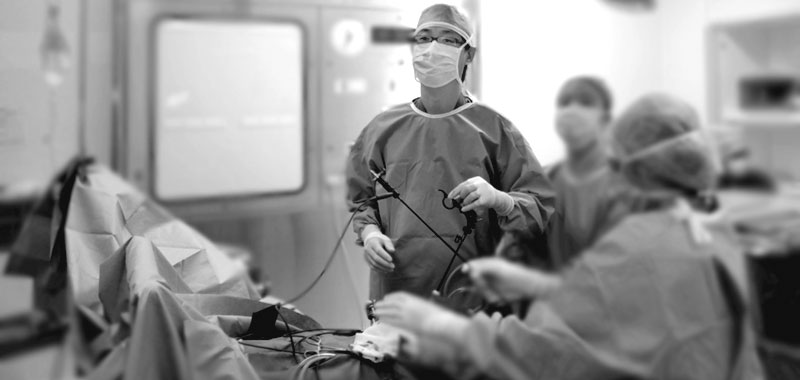What is a hernia?
A hernia is the protrusion of an organ (eg. small intestine, colon, bladder) through a weakness in the abdominal wall.
A hernia occurs when the inner layers of the abdomen tear or weaken. This area of weakening may be congenital (meaning that the abnormality was present at birth) or it may be acquired as a result of excessive strain on the abdominal wall from heavy lifting, excessive weight gain, persistent cough or chronic constipation. This weakened area allows the inner lining of the abdominal wall to bulge through and form a balloon-like sac. Consequently, abdominal organs may slip into this sac causing pain and other health problems.
Hernias can arise in men and women of all ages. The majority of hernias are located near the groin (inguinal hernia). They may also arise around the navel (umbilical hernia) and through old surgical incisions (incisional hernia).
What are the symptoms of a hernia?
A visible bulge in the abdominal wall or groin, especially when standing or coughing
- A dull aching sensation
- A sharp pain when straining
How is a hernia treated?
Hernias usually need to be repaired surgically.
The basic principles of hernia surgery are:
|
- Identification of the hernia sac
- Reduction of the hernia sac and its contents
In laymen’s terms, this means that the surgeon will return the sac and the abdominal organs within it back into the abdominal cavity
- Repair of the abdominal wall
The area of weakness must now be repaired. In most cases this would involve placement of a synthetic sheet or ‘mesh’ in order to buttress or reinforce the weakness in the abdominal wall
|
Techniques for Hernia Repair
Hernias may be repaired using ‘open’ or ‘laparoscopic’ techniques. We offer both open and laparoscopic hernia repair and will recommend the best method of repair for each individual situation.
Open Hernia Repair
The surgeon makes an incision in the skin directly over or close to the bulge of the hernia. He then dissects down through the underlying tissue until he identifies the hernia sac, reduces the sac and its contents and then proceeds to repair the weakness, usually by suturing a synthetic mesh in place.
These techniques for hernia repair have been in use for many decades and have a proven record in terms of safety and efficacy.
Laparoscopic Hernia Repair
Minimally invasive surgical techniques are used in hernia repair. Using specialized techniques: miniature video cameras, fibre-optic technology and high-definition video monitors, the surgeon is able to perform hernia repair through small incisions which usually require only a stitch or two to close.
The benefits of a laparoscopic hernia repair include:
|
- Tiny incisions and better cosmetic effect
- Reduced post-operative pain
- Shorter recovery time
- Earlier return to work
|
Totally Extra-Peritoneal (TEP) Repair for Inguinal (Groin) Hernias
Approximately 80% of hernias are inguinal or groin hernias. When performing laparoscopic inguinal hernia repair, we prefer the totally extraperitoneal approach.
The procedure is performed using just three small incisions in the lower abdomen. Dr Gan inserts a thin, telescope-like instrument (called an endoscope) through a small incision below the navel. The endoscope provides a view of the operating field. He operates through the other two incisions using long, narrow instruments. The entire procedure takes a little longer than an open repair.
Most of our patients are allowed to go home on the day of the surgery. Post-operative pain is reduced compared to open hernia repair: patients usually require only oral medication for pain control. Residual stiffness and soreness usually resolves within a week or two.
|







